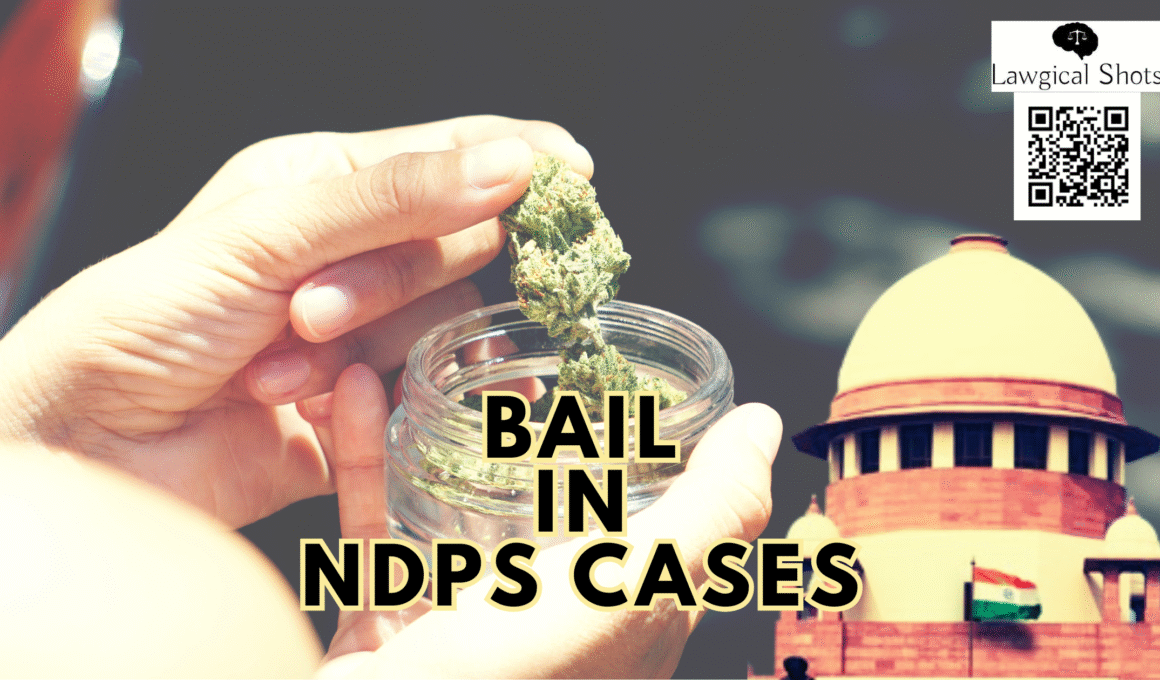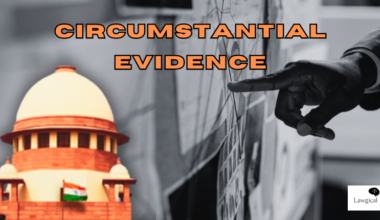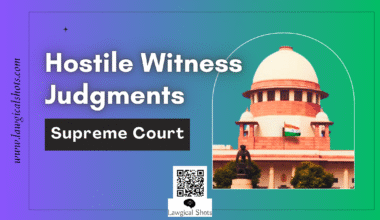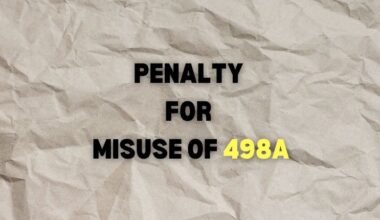You must have heard the phrase quite often – “Bail is the rule and jail is the exception”. That’s true in most of the cases. However, where there are special statutes like the Narcotic Drugs and Psychotic Substances Act, 1985, it overshadows the rules of procedural criminal laws. This has been held in several Supreme Court judgments. However, bail is still granted in NDPS cases, after Courts duly scrutinize the case. Here is a collection of top 10 landmark judgments on bail in NDPS Act cases.
Supreme Court Judgments on Bail in NDPS Act Cases
Kulwant Singh v. State of Punjab (2025)
The Supreme Court judgment on bail in NDPS Act pertains to the rejection of anticipatory bail to the accused by the High Court. The allegations pertained to the recovery of 550 tablets of Tapentadol Hydrochloride in the car in which the accused and co-accused were travelling. The Court referred to the judgments of High Courts wherein it was held that Tapentadol Hydrochloride is not a psychotropic substance, included in the Schedule of the NDPS Act. Thus, the Court found the accused entitled to pre-arrest bail.
Union of India v. Man Singh Verma (2025)
This was a unique case where two people were accused in NDPS case. Samples alleged to be narcotic substance was tested negative once, while the NCB sent it again to another lab test, which again came back negative. While the accused stayed in custody for 4 months, their bail application pending, a Closure Report was filed by NCB. However, the High Court entertained the bail application, questioned wrongful confinement, and directed the NCB Director to pay Rs 5 lakhs as compensation to them. The Apex Court explained that the jurisdiction of the High Court under CrPC Section 439 was limited to grant or refusal of bail pending trial. The Court questioned the Court for overstepping the bounds of jurisdiction. Thus, the Court held the compensation of Rs 5 lakhs lacking any legal authority and set aside the same.
Also check if you can travel abroad with a pending court case
Narcotic Control Bureau v. Lakhwinder Singh (2025)
In this case, the accused had spent 4.5 years in jail out of 10 years of sentence, while an appeal was pending. Therefore, the accused sought suspension of sentence and bail in NDPS Act case, which was allowed by the High Court. There was a detailed discussion over the umbrella application of judgment in Undertrial Prisoners v. UoI (1994), which laid about undergoing one-half of the sentence to be entitled to bail.
The Apex Court reasoned that “This judgment does not take away the power of the Court to grant regular bail even if the period undergone by a prisoner is less than what is provided in the said judgment. The judgment of this Court cannot be read to mean that the powers of the Court to grant bail have been curtailed.” It held that if a case was made out for grant of bail in NDPS Act, the Court should not be powerless if the accused has not undergone half the sentence. The Court held such a practice as a violation of rights under Article 21 of the Constitution and defeat the right to appeal. The Court held that if the appeal is not likely to be heard until the accused undergoes the entire sentence, the Court can exercise its power to release the accused on bail. The relief should not be denied merely on the ground of Section 37 of NDPS Act.
Ankush Vipan Kapoor v. Union of India (2024)
The case surrounded the High Court granting bail to the NDPS accused, then cancelling the same at the instance of NIA, while the Supreme Court had extended interim protection against any coercive steps. While acknowledging the transfer of case from Special Court in the State of Punjab to the Special Court in the State of Gujarat, being investigated by NIA along with Scheduled Offences under UAPA, the Court upheld the cancellation of bail. Therefore, the Court vacated the protection granted to the accused.
Narcotics Control Bureau v. Kashif (2024)
In this case, the High Court extended bail under NDPS Act to the accused on the ground of belated compliance of Section 52A. The Court clarified that the mandate under Section 37 was sine qua non, meaning inevitable for granting bail in NDPS Act. The Court further explained that the procedure for disposal of seized contraband drugs and substances in NDPS Act was to ensure early disposal. Any lapse or delayed compliance of Section 52A was a mere procedural irregularity. It would neither entitle the accused to bail in NDPS case, nor vitiate the trial. The Court remanded the matter back to the High Court to decide the bail application afresh, this time on merits and applicable law.
Union of India v. Ajay Kumar Singh (2023)
The accused in this case initially avoided arrest for more than a year, and was arrested from a restaurant. While the High Court had allowed bail in NDPS case, the Supreme Court through an SLP suspended the release through an interim order. The High Court allowed the bail since two co-accused had been released on bail, while the Supreme Court noted that he was the main accused, and other two being released was insufficient reason for granting bail in NDPS case. The Court further questioned the ignorance of twin conditions for bail under Section 37 NDPS Act by the High Court, since it was a case of commercial quantity.
The Supreme Court held that in the absence of High Court recording that the accused was not prima facie guilty of the offence alleged, and was not likely to commit the same when granted bail, the Court set aside the bail granted by the High Court.
Sami Ullaha v. Superintendent, NCB (2008)
The Supreme Court considered the question of whether bail granted in NDPS case could be cancelled after a report analysis of articles recovered containing ‘heroin’. The Apex Court analysed that while entertaining an application seeking cancellation of bail, the misuse of liberty granted to the accused must be proved. The accused may have attempted to tamper with evidence, influence witnesses or there was a possibility of the accused absconding. While hinting at the importance of commercial quantity of contraband, the Court stated that it is one of the factors to be considered by Courts while deciding the grant or refusal to grant bail in NDPS cases. However, the criteria was not approved for cancellation of bail already granted.
Ratan Kumar Vishwas v. State of UP (2008)
The Supreme Court in this case dealt with a case wherein parameters of Section 37 were not fulfilled to extend the benefit of bail by suspension of sentence as per Section 37 of NDPS Act. In this landmark judgment on bail in NDPS Act, the Court expressed that “To deal with the menace of dangerous drugs flooding the market, Parliament has provided that a person accused of offence under the Act should not be released on bail during trial unless the mandatory conditions provided under Section 37 that there are reasonable grounds for holding that the accused is not guilty of such office and that he is not likely to commit any offence while on bail are satisfied.”
Sayed Abul Ala v. Union of India (2007)
The Supreme Court judgment on bail in NDPS case illuminated the role of the detaining authority. The Court stated that the detaining authority had to consider the restrictions imposed on Court’s power (Section 37 of the Act) in granting bail in NDPS cases. The Court sought proper application of mind by the detaining authority from the detention order. For detenu in custody, the detaining authority should bring some material on record to justify the accused’s release on bail. The Court directed that “If the detenu was involved in a large number of cases and the prosecution was aware of the same, it would invariably be brought to the notice of the court dealing with the application of bail filed by the detenu by the public prosecutor.”
As per the Court, detention order may be passed by the Court being satisfied with the following:
“(1) if the authority passing the order is aware of the fact that he is actually in custody;
(2) if he had a reason to believe on the basis of reliable material placed before him
(a) that there is a real possibility of his being released on bail, and
(b) that on being released, he would in all probability indulge in prejudicial activities; and
(3) it is felt essential to detain him to prevent him from so doing.”
Narcotic Control Bureau v. Kishan Lal (1991)
In this case, the Supreme Court considered the question whether the Special Courts’ power to grant bail NDPS cases was restricted by Section 37(2) of Narcotic Drugs and Psychotic Substances Act, 1985. The Supreme Court highlighted the non-obstante clause at the beginning of Section 37, which clearly intends to restrict the powers to grant bail. The High Court’s powers under Section 439 of CrPC were not shielded against the said limitation under Section 37 of NDPS Act. The Court further clarified that in case of inconsistency between CrPC Section 439 and NDPS Section 37, the latter prevails.








